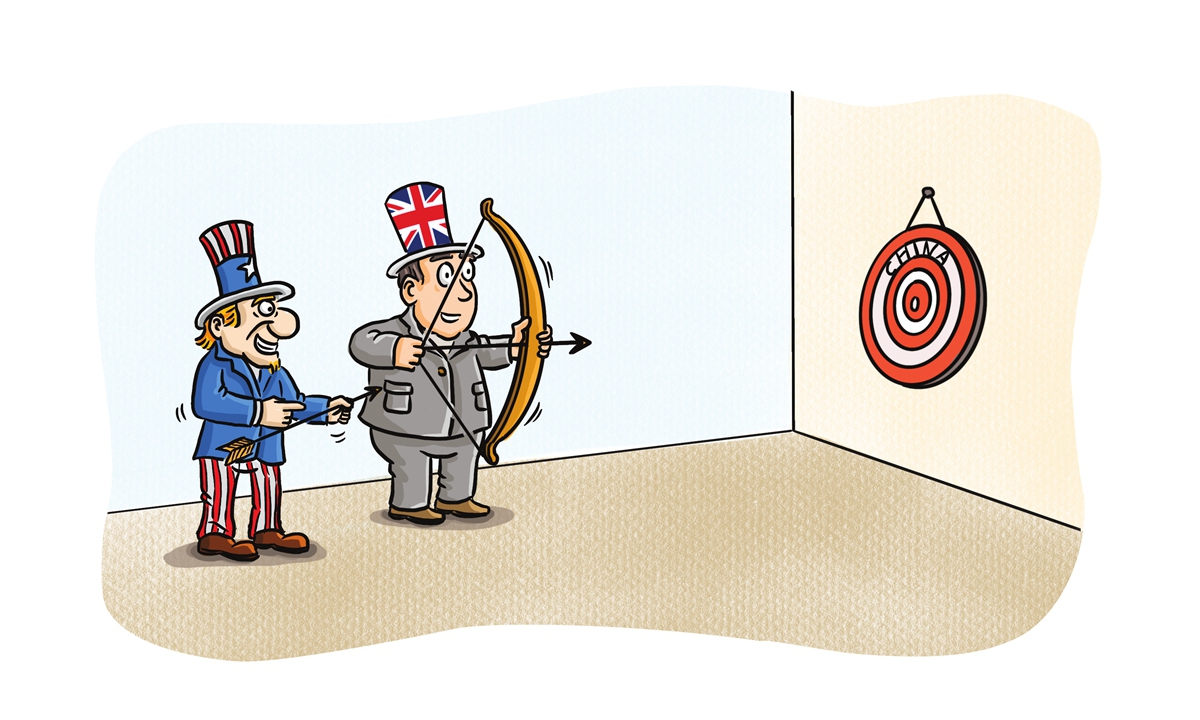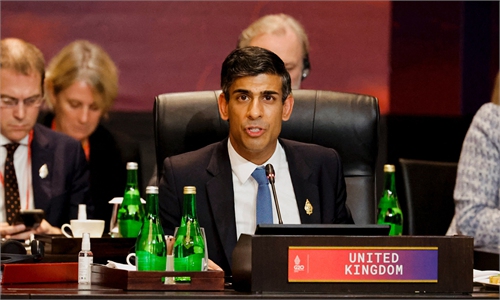
Illustration: Xia Qing/GT
UK Prime Minister Rishi Sunak announced on Sunday that the UK will ramp up investment in defense to meet the challenges of an increasingly volatile and complex world, as the UK government launched an update to the 2021 Integrated Review (IR). The IR Refresh sets out how the UK will adapt approach on China to deal with "the epoch-defining challenge presented by the Chinese Communist Party's increasingly concerning military, financial and diplomatic activity.""China represents the biggest state threat to our economic interests, for sure. And it's a systemic challenge for the world order," Sunak also said in an NBC interview on Sunday after he arrived in San Diego for a three-way summit with US President Joe Biden and Australian Prime Minister Anthony Albanese.
London has been singing the same old song by advocating challenges and threats posed by Beijing. Against the backdrop of the competition between China and the US, the UK has heavily tilted toward the US in its foreign policy. It is not surprising to see Britain refresh the IR to echo the radical anti-China rhetoric of Washington. However, it is necessary to remind London that this is of no significance since its international status today is far inferior to what it used to be, and its influence and role on the international stage will likely continue to decline.
Britain's domestic livelihood problems, as well as its social, political, and economic conditions after Brexit, are worsening. Instead of focusing more on solving domestic woes, the UK has decided to increases investment in defense to tackle the perceived threats of China and Russia. The IMF recently forecast the UK economy to contract 0.6 percent in 2023. That would not just be worse than all other G7 economies. Hyping so-called threats posed by China will be of no help in solving the UK's social ills and economic conundrums.
Sunak's aggressive remarks toward China were largely meant to cater to Washington. Today, Britain's diplomacy, including its policy toward China, is to a large extent influenced by the US. Notably, after Brexit, the space for British politics and social policies has become increasingly narrow; the country has lost its previous pragmatism in diplomacy and its diplomatic flexibility has become limited.
Regrettably, Britain has not chosen to embrace the radically changing world on the basis of cooperation and multilateralism. Instead, it discarded its diplomatic idea of building a golden era for China-UK economic cooperation that it once pursed but has chosen to tie itself to the US' chariot and engaged in the US-led camp confrontation.
This has brought the UK back to the traditional geopolitical mindset of relying on the US. In NATO, the Russia-Ukraine conflict, and the Asia-Pacific region, London has become a henchman of Washington.
This choice is very detrimental to the UK's own interests and does not benefit the country. In the Western camp, despite being its allies, the US has no mercy on Britain and the EU in the economic and trade fields. Washington is attempting to sacrifice the interests of its allies to serve its own and to build its international influence and maintain US' hegemony. As tying itself to the US, Britain should be prepared to be stabbed in the back by the US at any time.
It should be emphasized that the UK cannot be separated from China to sustain its future economic development. As a country built on international trade, London cannot neglect the world's second-largest economy.
But if the UK continues to follow the US' suit in taking a tough position against China, it will lose a pile of investment and trade opportunities in the economic cooperation field. The UK's higher education sector also remarkably benefits from the large personnel exchanges with China.
If China-UK relations further deteriorate, many departments in plenty of UK universities could be implicated. What's more important is that the UK's diplomatic space on the international stage will become narrower due to its one-sided foreign policy.
The author is a scholar at Shanghai International Studies University. opinion@globaltimes.com.cn



